七年级英语下册Unit1DailyLife语法篇试题北师大版
北师大版初中英语七年级下册巩固练习--Unit 1 Daily Life(句式)
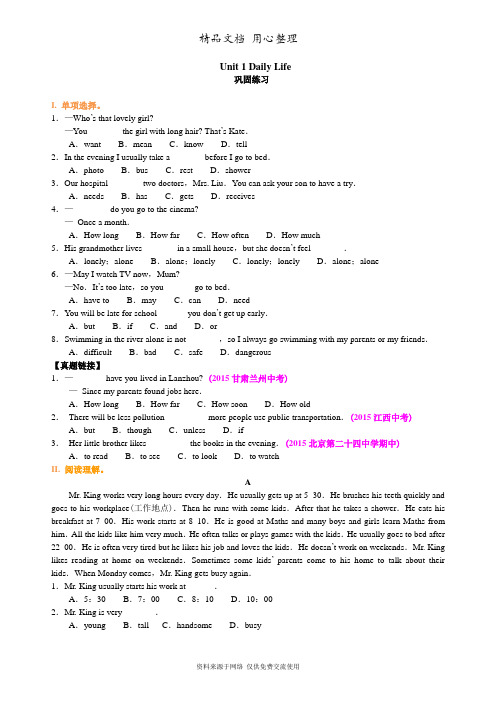
Unit 1 Daily Life巩固练习I. 单项选择。
1.—Who’s that lovely girl?—You _______ the girl with long hair? That’s Kate.A.want B.mean C.know D.tell2.In the evening I usually take a _______ before I go to bed.A.photo B.bus C.rest D.shower3.Our hospital _______ two doctors,Mrs. Liu.You can ask your son to have a try.A.needs B.has C.gets D.receives4.—_______ do you go to the cinema?—Once a month.A.How long B.How far C.How often D.How much5.His grandmother lives _______ in a small house,but she doesn’t feel _______.A.lonely;alone B.alone;lonely C.lonely;lonely D.alone;alone6.—May I watch TV now,Mum?—No.It’s too late,so you ______ go to bed.A.have to B.may C.can D.need7.You will be late for school ______ you don’t get up early.A.but B.if C.and D.or8.Swimming in the river alone is not _______,so I always go swimming with my parents or my friends.A.difficult B.bad C.safe D.dangerous【真题链接】1.—_______ have you lived in Lanzhou?(2015甘肃兰州中考)—Since my parents found jobs here.A.How long B.How far C.How soon D.How old2.There will be less pollution _________ more people use public transportation.(2015江西中考) A.but B.though C.unless D.if3.Her little brother likes _________ the books in the evening.(2015北京第二十四中学期中) A.to read B.to see C.to look D.to watchII. 阅读理解。
北师大版七年级下册《Unit 1 Daily life》2017年同步练习卷(第一课时)-教师用卷

北师大版七年级下册《Unit 1 Daily life》2017年同步练习卷(第一课时)副标题一、单选题(本大题共7小题,共7.0分)1.Lily always_______ her lunch after school.()A. haveB. hasC. to haveD. to has【答案】B【解析】答案:B根据题意:莉莉总是放学后吃午饭.always说明是一般现在时,主语是三单式Lily,所以动词用三单式has,故选B.莉莉总是放学后吃午饭.熟悉实义动词的三单式的基本用法,结合题意,给出答案.2.________ he often go fishing in the lake?()A. DoB. DoesC. AreD. Is【答案】B【解析】答案:B 分析句子,结合选项,推测意思是他经常去湖里钓鱼吗?这里叙述经常性的动作,用一般现在时,主语是三单,故借助助动词does,故选B.他经常去湖里钓鱼吗?解答这类试题时,务必充分理解上下文的语境和前后文的逻辑关系,找到解题的依据,同时正确区分选项的细微差别,准确作答.3.My brother _________ his homework at home because he does it at school.()A. isn't doB. doesn't doC. doesD. do【答案】B【解析】答案:B.根据My brother _________ his homework at home because he does it at school,可知这里句子叙述一件事实,时态用一般现在时,do是一个实意动词,否定形式需要加助动词,主语是单数,加does.故选B.我弟弟不在家做作业,因为他在学校做作业.考查否定句.通常是在be动词,情态动词后加not.一般现在时态,主语不是第三人称单数用don't,主语是第三人称单数用doesn't.一般过去时态用didn't.还有其它用法需要牢记.4.I always get up ________ 6:30am.What about you?()A. inB. onC. toD. at【答案】D【解析】答案:D 分析句子,结合选项,推测意思是我总是在上午的六点半起床,你呢?后面是具体的时间点,用at,故选D.我总是在上午的六点半起床,你呢?解答这类试题时,务必充分理解上下文的语境和前后文的逻辑关系,找到解题的依据,同时正确区分选项的细微差别,准确作答.5.Are you never late ________ school?No,I'm not.()A. forB. ofC. fromD. in【答案】A【解析】答案:A be late for.介词for后可接名词可用来表示目的.解释为"为了",介词to 表示修饰关系,解释为"向、往、到".介词of 表示人物的特性,"关于、…的、由…组成",介词in"从事于,在…之内",be late for.译为因…而迟到.根据题意"-你上学从不迟到吗?-是的,我从不迟到".故选A.-你上学从不迟到?-是的,我从不迟到.本题考查介词的辨析,在熟知各个介词意思的基础上与句子的语境相结合,从而得出正确的答案.6.My first class ______ at 8:30am and school _______ at 4:00pm.()A. start,finishB. starts,finishC. start,finishesD. starts,finishes【答案】D【解析】答案:D根据题意:我的第一节课在上午八点半开始,下午四点放学.可知时态为一般现在时,主语class,school都是三单式,所以动词都用三单式,故选D.我的第一节课在上午八点半开始,下午四点放学.熟悉实义动词的三单式的基本用法,结合题意,给出答案.7.Does your mother always cook breakfast for your family?---Yes,___________.()A. .She doesB. .he doesC. my mother doesD. .my mother doesn't【答案】A【解析】答案:A.根据Does your mother always cook breakfast for your family,可知这里是does引导的一般疑问句,回答还应该用does回答,your mother 用she代替.故选A.--你妈妈总是给你的家人做早餐吗?--是的,她做.一般疑问句肯定回答:Yes,主语+一般疑问句开头的那个单词.否定回答:No,主语+一般疑问句开头的单词和not.要注意人称的变化.二、阅读理解(本大题共5小题,共10.0分)AI will go on a trip (旅行)next Tuesday,and I need a car to get around the places.So I calla car rental agency (租赁代理机构)to rent a car for it.I ask the worker about the kinds of cars there.He tells me there are fifteen kinds of cars and I need to see the cars with my own eyes.Then I go to the agency this Sunday.After thinking for two hours,I rent an SUV becauseI plan to drive to many places,even in some parks.The worker tells me that the SUV will cost55 a day.I hope there are no problems with the SUV before I drive it away from the agency.So I have agood inspection.I don't find any problems.So I drive the car away and get ready to enjoy my trip.8.How will the writer go on the trip?______A. By train.B. By air.C. By car.D. By bus.9.When does the writer rent the SUV?______A. On Tuesday.B. On Thursday.C. On Saturday.D. On Sunday.10.Which is TRUE according to the passage?______A. The writer is not good at driving.B. The writer rents the SUV without thinking.C. The SUV will cost the writer $110 for two days.D. There are some problems with the SUV.11.What does the word"inspection"mean in Chinese?______A. 参观B. 检查C. 处理D. 维修12.What does the passage mainly (主要地)talk about?______A. An interesting tirp.B. A car rental agency.C. Making a plan for routines.D. Renting a car for a trip.【答案】【小题1】C 【小题2】D 【小题3】C 【小题4】B 【小题5】D 【解析】CDCBD1.C.细节题.结合I will go on a trip (旅行)next Tuesday,and I need a car to get around the places.可知是开车去,故选C.2.D.细节题.结合Then I go to the agency this Sunday可知是周日去租的,故选D.3.C.推理题.The worker tells me that the SUV will cost 55 a day.一天是55,两天就是110.故选C.4.B.推理题.结合I have a good inspection.I don't find any problems可知没发现问题,可是检查了一下,故选B.5.D.主旨题,结合I will go on a trip (旅行)next Tuesday,and I need a car to get around the places可知是有关租车去旅行,故答案是D.下周二我将会去旅行,打电话给租车公司租了一辆SUV.阅读题型,要注重句子与句子之间、段落与段落之间逻辑关系以及对篇章的整体理解.根据所给问题选择正确选项完成试题.三、句型转换(本大题共4小题,共8.0分)13.My sister has lunch at school every day.(改为否定句)______.【答案】My sister doesn't have lunch at school every day【解析】答案:My sister doesn't have lunch at school every day.考查否定句.由has第三人称单数.可知一般现在时态,注意sister单数.含有实意动词,变否定句在实意动词前加doesn't.实意动词用原形have.答案是My sister doesn't have lunch at school every day.--我妹妹每天在学校吃午饭.--我妹妹每天都不在学校吃午饭.考查否定句.通常是在be动词,情态动词后加not.一般现在时态,主语不是第三人称单数用don't,主语是第三人称单数用doesn't.一般过去时态用didn't.还有其它用法需要牢记.14.We have 4 lessons in the morning.(对划线部分提问)______.【答案】How many lessons do you have in the morning?【解析】答案:How many lessons do you have in the morning?考查划线部分提问.根据4.可知,对数量提问,且修饰可数名词复数.用疑问词组how many多少.后加名词复数lessons.疑问词组后跟一般疑问句.注意we我们.一般现在时态,含有实意动词,变一般疑问句用助动词do.第一人称we变为第二人称you.谓语动词用原形have.答案是How many lessons do you have in the morning?--我们上午有4节课.--你上午有几节课?对划线部分提问,要根据划线部分内容选择合适的疑问词,剩下的变为一般疑问句.注意区分疑问词的用法.会正确运用一般疑问句用法.15.My parents go shopping 3times a month.(对划线部分提问)______.【答案】How many times do your parents go shopping a month?【解析】答案:How many times do your parents go shopping a month?考查划线部分提问.根据3 times三次.可知,对数量提问,且修饰可数名词复数,用how many多少.修饰可数名词复数times次数.后跟一般疑问句.主语parents复数.一般现在时态,含有实意动词.变一般疑问句用助动词do.主语your parents.谓语动词用原形go.答案是How many times do your parents go shopping a month?--我父母一个月去购物3次.--你父母一个月去购物几次?对划线部分提问,要根据划线部分内容选择合适的疑问词,剩下的变为一般疑问句.注意区分疑问词的用法.会正确运用一般疑问句用法.16.How often do you visit your parents?(用 once a week回答)______.【答案】I visit my parents once a week【解析】答案:I visit my parents once a week.考查特殊疑问句的回答.问句中的主语you你,回答时用I我.一般现在时态.谓语动词用原形visit.your你的,变为my我的.修饰名词parents父母.once a week每周一次.做状语.答案是I visit my parents once a week.--你多久去看望你父母一次?--我每周去看望父母一次.考查特殊疑问句的回答,注意时态,人称的变化.结合语境完成试题.四、补充句子(本大题共1小题,共2.0分)17.起床______2.brush my teeth______3.弹钢琴______4.after dinner______.5.需要做….______6.Before 9:00______7.look at the stars______8.be late for______9.到达______10.practise tennis______.【答案】get up;刷牙;play the piano;晚饭后;need to do;九点之前;看星星;迟到;get to;练习网球【解析】1.get up (考查短语)2.刷牙(考查短语)3.play the piano4.晚饭后(考查短语)5.need to do (考查短语)6.九点之前(考查短语)7.看星星(考查短语)8.迟到(考查短语)9.get to(考查短语)10.练习网球(考查短语)根据所给的汉语或英语,可得出答案.1.get up2.刷牙3.play the piano4.晚饭后5.need to do6.九点之前7.看星星8.迟到9.get to10.练习网球注意短语结构和单词的拼写形式.。
北师大版英语七年级下册Unit 1 Daily Life Lesson 1 After School
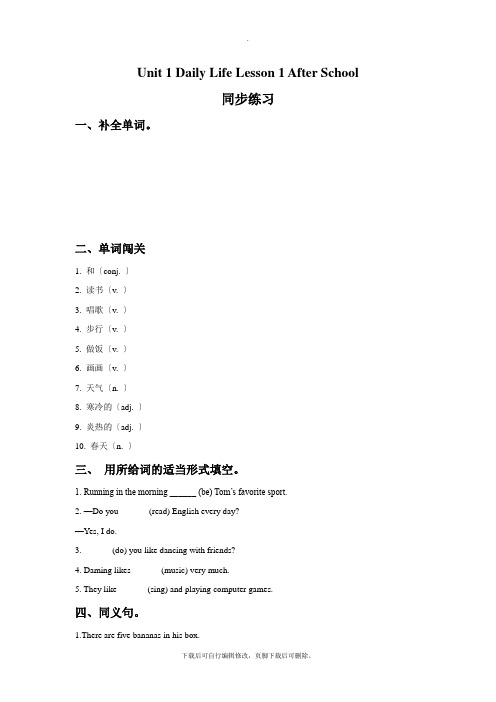
Unit 1 Daily Life Lesson 1 After School同步练习一、补全单词。
二、单词闯关1. 和〔conj. 〕______________2. 读书〔v. 〕______________3. 唱歌〔v. 〕______________4. 步行〔v. 〕______________5. 做饭〔v. 〕______________6. 画画〔v. 〕______________7. 天气〔n. 〕______________8. 寒冷的〔adj. 〕______________9. 炎热的〔adj. 〕______________10. 春天〔n. 〕_____________三、用所给词的适当形式填空。
1. Running in the morning ______ (be) Tom’s favorite sport.2. —Do you ______ (read) English every day?—Yes, I do.3. ______ (do) you like dancing with friends?4. Daming likes ______ (music) very much.5. They like ______ (sing) and playing computer games.四、同义句。
1.There are five bananas in his box._______ ________ five bananas in the box.2. We have a good time in school.We ________ ________ in school.3. I get to the library at six.I _________ ________ the library at six.4. There is a pay phone in the neighborhood.There’s a pay phone ________ _________.5. My aunt buys hamburgers for five dollars.My aunt ________ five dollars ________ hamburgers.五、选择填空。
七年级英语下册Unit1DailyLife语法篇(含答案)
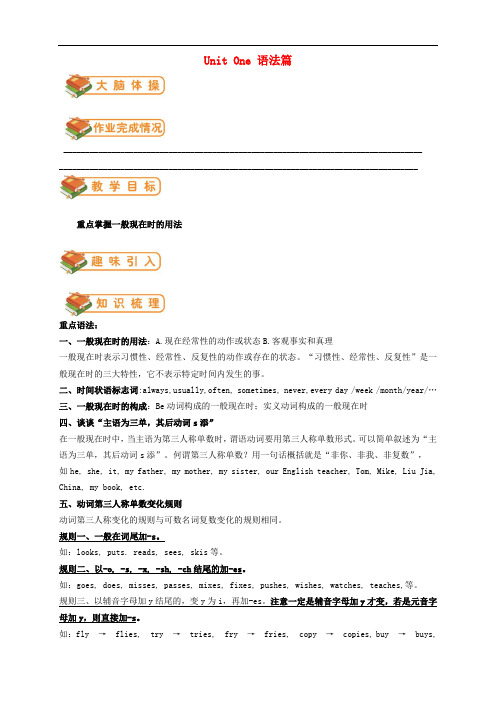
Unit One 语法篇____________________________________________________________________________________________________________________________________________________________________重点掌握一般现在时的用法重点语法:一、一般现在时的用法:A.现在经常性的动作或状态B.客观事实和真理一般现在时表示习惯性、经常性、反复性的动作或存在的状态。
“习惯性、经常性、反复性”是一般现在时的三大特性,它不表示特定时间内发生的事。
二、时间状语标志词:always,usually,often, sometimes, never,every day /week /month/year/…三、一般现在时的构成:Be动词构成的一般现在时;实义动词构成的一般现在时四、谈谈“主语为三单,其后动词s添”在一般现在时中,当主语为第三人称单数时,谓语动词要用第三人称单数形式。
可以简单叙述为“主语为三单,其后动词s添”。
何谓第三人称单数?用一句话概括就是“非你、非我、非复数”,如he, she, it, my father, my mother, my sister, our English teacher, Tom, Mike, Liu Jia, China, my book, etc.五、动词第三人称单数变化规则动词第三人称变化的规则与可数名词复数变化的规则相同。
规则一、一般在词尾加-s。
如:looks, puts. reads, sees, skis等。
规则二、以-o, -s, -x, -sh, -ch结尾的加-es。
如:goes, does, misses, passes, mixes, fixes, pushes, wishes, watches, teaches,等。
北师大版英语七年级下册Unit 1 Daily Life Lesson 2 A Dangerous Job 同步练习1

Unit 1 Daily Life Lesson 2 A Dangerous Job同步练习一、补全单词。
1._est2.i_portant3.some_ne4.slee_5.fire_ighting6.fi_emu_icate 8.dri_e9.tra_ning 10.sa_e二、写出频度副词。
1.总是,一直()2.通常()3.经常()4.有时()5.很少()6.稀少()7.几乎不()8.从不()三、单项选择()1.---How often does your sister surf the Internet?---About______.A. three timeB. three timesC. three time every dayD. three times a day ()2.---When is your father going to Hong Kong?---He is going there ______July 28th.A. onB. atC. inD. to()3. Thank you for ______me find my little cat yesterday.A.helpB. helpsC. helpedD. helping()4.Are you good at ______?A. swimB. swimmingC. to swimD. swam()5. ---Could I use your computer?---____________.A. Yes, I can.B. Yes, you can’tC. Sorry, you can’tD. No can’t.()6. --- ______ does it take you to watch TV?---About forty minutes.A. How longB. How muchC. How oftenD. How many四、我会填。
北师大版七年级英语下册同步检测Unit 1 Daily Life Lesson 3

Unit 1 Daily Life Lesson 3Safety First同步练习1. They will have many a during the spring festival.2. If I fthese tasks, we can go to the concert.3. Don't play football on the road. It's very d .4. --- Is it sto cross the road now? --- No, it's very dangerous. You mustn't go until the traffic lights turn green.5. My dream is to t around the world.6. Edison rushed out and carried the boy to (安全).7. I have his phone number in my (地址) book.8. It's (危险) to cross the roads when the lights are red.9. To many people, the meaning of a name is (重要的).10.In my school, students not only work hard, but also take part in all kindsof (活动), such as dancing, drawing, reading and so on.11. --- What does David like?--- He likes basketball, so he often it in theafternoon.A. to play; playingB. playing; to playC. playing; playsD. plays; to play12. Does Amy music?A. likes listening toB. like listeningC. like listening toD. likes to listen to13. --- What your father often on weekends?--- He often watches TV at home.A. do; doesB. does; doesC. do; doD. does; do14. Her father is a teacher. He in a high school.A. teachB. teachsC. teachesD. teaching15. Don't play fire. It's dangerous.A. withB. /C. forD. in16. 我做家庭作业,然后在10点钟上床睡觉。
七年级英语下册Unit 1 Daily Life Lesson 1 After School同步练习(新版)北师大版
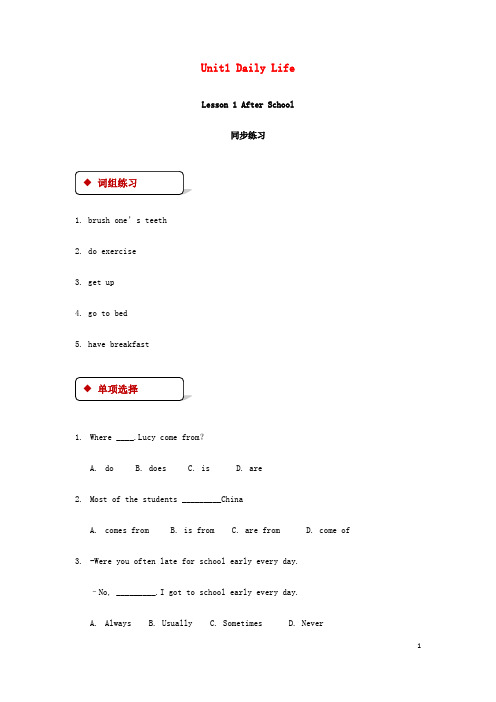
Unit1 Daily LifeLesson 1 After School同步练习1. brush one’s teeth2. do exercise3. get up4. go to bed5. have breakfast1.Where ____.Lucy come from?A.doB. doesC. isD. are2.Most of the students _________Chinaes fromB. is fromC. are fromD. come of3.-Were you often late for school early every day.–No, _________.I got to school early every day.A.AlwaysB. UsuallyC. SometimesD. Never4. -John sings so well. Has he ever been trained?-No. He learns all by himself. He _________goes to any training class.A. usuallyB. oftenC. neverD. even5. –Miss Gao is very popular with her students.-Yes, Her classes are _________lively and interesting.A. seldomB. neverC. sometimesD. always1. He is r _________busy today.2.Mr. Wang teaches us b _________at school.3. T _________is the fifth day of a week.4. Our math teacher is very s _________and he makes us very tired.5. What’s your f _________sport?-Football.1. I want ______ (put) these books in the box.2. This table is too heavy. I can’t ______ (carry) it.3. Let s ______ (take) the twins to the classroom.4. Could you ______ (help) me?5.There ______ (be) a pencil and two books on the desk.请根据下表的内容写一篇关于lilei的文章。
初中英语北师大版七年级下册Unit1DailyLife单元练习

初中英语学习资料madeofjingetieji初中英语北师大版七年级下册Unit1 Daily Life单元练习一、听力 ( 听力 ) (共20小题;共20分)Ⅰ . 听句子,选出句中所包括的信息。
(共 5 小题,每题 1 分,计 5分)1. A. homework B. housework C. teamwork2. A. S615 B. F650 C. F6153. A. go shopping B. go skating C. go swimming4. A. Tony got home too late last night.B.Tony didn't go to bed last night.C.Tony stayed up late last night.5. A. It is the best way to take exercise.B.Taking exercise can keep you relaxed.C.To keep healthy, you should take exercise.Ⅱ . 听句子,选出该句的最正确答语。
(共 5 小题,每题 1 分,计 5 分)6. A. Yes, I love it.B.It was boring.C.No, I didn't watch it.7. A. Bad luck! B. I think so. C. That's right.8. A. Yesterday evening.B.It's faster.C.I'm not sure about that.9. A. Yes, I'd love to.B.I watched it with my brother.C.No, I wouldn't.10.A. He's training.B.He's thirty years old.C.He's our coach.Ⅲ . 听对话和问题,选择最正确答案。
(完整版)北师大版七年级下册英语unit1知识点总结语法点(含答案)

知识图谱Unit 1 Daily Life知识精讲一、必背词汇daily adj. 每日的;日常的routine n. 常规;正常顺序wash v. 洗activity n. 活动drum n. 鼓vi. 击鼓, 作鼓声, 引起兴趣vt. 召集入伍, 逐出, (经过努力)推动, 连续击打never adv. 从不;决不alone adv. 独自;单独seldom adv. 不常;很少always adv. 总是;一直news n. 新闻;消息sometimes adv. 有时;间或finish v. 完成;结束early adv. 提早,提前adj. 早期的;早到的match n. 比赛;竞赛;火柴v. 匹配note n. 笔记;记录;便条try v. 试;试图n. 尝试;努力best n. 最好的事物(或人)adj. adv.最好的keep v. (使)保持;处于safety n.安全;中卫adj.保障安全的bicycle n. 自行车v. 骑自行车storm n. 暴风雨v. 猛攻, 捣毁, 起风暴travel v. 旅行n. 旅行,旅游online adv. 在线地adj. 在线的联网的during prep. 在……期间内bad adj. 坏的;不好的lightning n. 闪电adj. 闪电般的vi. 打闪stay v. 停留;待phone n. 电话v. 打电话mean v. 意思是point n. 观点;尖端,点v. 指向address n. 地址;通信处;演说;称呼smoke v. 吸烟;抽烟n. 烟bath n. 洗澡;洗浴away adv. 离开(某距离);去别处minute n. 分钟;一会儿need v. 需要more adv. 更;更多star n. 恒星;星;明星dress v. 穿衣服n. 连衣裙二、重点词汇1. alone adjective , adverb /əˈləʊn/without other people单独(的),独自(的);孤独的(地),无伴的(地)1). He likes being alone in the house.他喜欢自己一个人呆在家里。
七年级英语下册Unit1DailyLife词汇篇试题新版北师大版
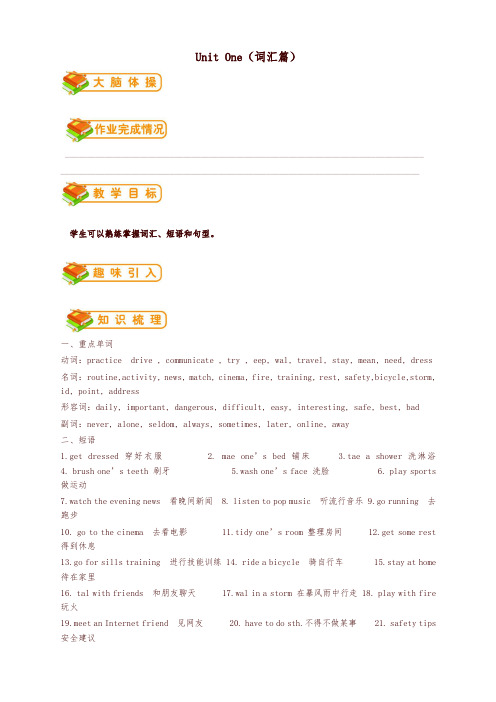
Unit One(词汇篇)____________________________________________________________________________________________________________________________________________________________________学生可以熟练掌握词汇、短语和句型。
一、重点单词动词:practice drive , communicate , try , eep, wal, travel, stay, mean, need, dress 名词:routine,activity, news, match, cinema, fire, training, rest, safety,bicycle,storm, id, point, address形容词:daily, important, dangerous, difficult, easy, interesting, safe, best, bad副词:never, alone, seldom, always, sometimes, later, online, away二、短语1.get dressed 穿好衣服2. mae one’s bed 铺床3.tae a shower 洗淋浴4. brush one’s teeth 刷牙5.wash one’s face 洗脸6. play sports 做运动7.watch the evening news 看晚间新闻 8. listen to pop music 听流行音乐 9.go running 去跑步10. go to the cinema 去看电影11.tidy one’s room 整理房间 12.get some rest 得到休息13.go for sills training 进行技能训练 14. ride a bicycle 骑自行车 15.stay at home 待在家里16. tal with friends 和朋友聊天 17.wal in a storm 在暴风雨中行走 18. play with fire 玩火19.meet an Internet friend 见网友 20. have to do sth.不得不做某事 21. safety tips 安全建议22. have a point 有道理 23.stay away from 远离三、句型1.----What do you do after school? 你放学后做什么?----I usually read boos. 我通常看书。
2015春北师大版英语七下Unit 1《Daily Life》单元测试卷

Unit 1 Daily Life检测题(时间:60分钟,满分:100分)一、听力测试(满分15分)Ⅰ、听对话,根据对话内容选择正确答案,每段对话读一遍。
(每小题1分,满分5分)1、Tom often plays basketball _________、A、in the morningB、in the afternoonC、in the evening2、Tim usually eats breakfast _________、A、at six o’c lockB、at seven o’clockC、at about nine o’clock3、Paul _________ in the morning、A、runsB、does his homeworkC、watches TV4、Lucy goes to bed _________ 、A、at six o’clockB、at seven o’clockC、at about nine o’clo ck5、Ellen usually_________ her homework in the evening、A、can’t doB、doesC、doesn’t doⅡ、听对话及对话后的问题,选择正确的答案,每段对话读两遍。
(每小题1分,满分5分)6、A、Yes, he does、B、Yes, he is、C、No, he doesn’t、7、A、No, she isn’t、B、Yes, she does、C、No, she doesn’t、8、A、No、101、B、No、110、C、No、011、9、A、Yes, she does、B、No, she doesn’t、C、Yes, it is、10、A、At 9:00 p、m、B、At 6:20 p、m、C、At 7:00 p、m、Ⅲ、听短文,填入所缺的单词,短文读两遍。
(每小题1分,满分5分)We go to school from Monday to Friday、We have four classes in the 11 and three in the afternoon、We have 12 things to do after class、On Monday and 13 afternoon we have P、E、On Wednesday morning some of us have a singing class、On14 morning some have a drawing class、On Friday 15 we practice speaking English、11、________ 12、________ 13、________ 14、________ 15、________二、单项填空(每小题1、5分,满分15分)16、—What’s the time?—It’s _______ three-thirty、A、ofB、aroundC、atD、in17、I usually go to bed _______ ten o’clock、A、inB、afterC、onD、from18、Please write and tell me _______ your school day、A、aboutB、forC、withD、to19、We often do _______ homework at home、A、weB、usC、ourD、the20、Please come _______ here、Don’t go _______ now、A、to; homeB、/; to homeC、/; homeD、to; to home21、I at ten o’clock in the evening、A、have breakfastB、get upC、go to bedD、have lunch22、Mary eats dinner at 7:30 in the evening、A、aB、anC、theD、/23、Sorry, I can’t go with you、I have _______ homework to do、A、littleB、manyC、lots ofD、a lot24、—_______ do you eat breakfast?—At seven-thirty、A、WhatB、What timeC、WhereD、How25、—What’s the time?—It’s 12:00、Let’s go for 、A.b reakfast B、lunchB.C、supper D、dinner三、完形填空(每小题1、5分,满分15分)Sunday 26 the favourite day for our family、My parents 27 not at work、My sister and I 28 go to school、We 29 at home and 30 in the morning、In the afternoon, my sister and I 31 out to buy some different things、My sister likes songs、She 32 new CDs、I buy storybooks, a doll, a kite and things 33 that、We also buy some small gifts (礼物) 34 our parents、We 35 them、They love us, too、We live in a happy family、26、A、is B、areC、comesD、goes27、A、is B、areC、doD、does28、A、don’t B、doesn’tC、can’tD、aren’t29、A、play B、goC、stayD、come30、A、play B、playingC、to playD、plays31、A、going B、goC、goesD、to go32、A、buys B、buyingC、to buyD、buying33、A、with B、likeC、inD、for34、A、for B、onC、toD、at35、A、love B、haveC、hasD、loves四、阅读理解(每小题2分,满分20 分)AIn many English homes people eat four meals a day、They have breakfast at any time from seven to nine in the morning、They eat porridge (粥), eggs or bread and drink tea or coffee at breakfast、Lunch comes at one o’clock、Afternoon tea is from four to five in the afternoon and dinner is about half past seven、First they have soup, and then they have meat or fish with vegetables、After that they eat some other things, like bananas, apples or oranges、But not all English people eat like that、Some of them have their dinner in the middle of the day、Their meals are breakfast, dinner, tea and supper and all these meals are very simple、36、Many English people have meals a day、A、twoB、threeC、fourD、five37、People may have for their breakfast according to the passage、A、tea and eggsB、hamburgers and teaC、coffee and saladD、eggs and fish38、People have lunch at 、A、any timeB、nineC、fiveD、one39、People don’t have for their dinner、A、bananas and applesB、soup and meatC、meat and fishD、porridge40、Most Englishmen have dinner 、A、at oneB、at any timeC、at noonD、in the eveningBJohn is an English boy、He comes to China with his father and mother、They come here towork、John comes to study Chinese、He is in No、10 Middle School、He gets up early every day、He is never late for school、He studies hard、He can read and write English well、He often helps us with our English, and we often help him with his Chinese、After class, he likes playing football, swimming, running, jumping and riding、He makes many friends here、We’re very glad to stay with him、On Sunday, he often helps his mother clean the house, mend (修理) something or do some shopping、He likes Chinese food very much、He likes living here、He likes the Chinese students very much、We all like him, too、根据短文内容,判断正(T)误(F)。
七年级英语下册 Unit 1 Daily Life Lesson 2 A Dangerous Job同步练习 (新版)北师大版

Unit1 Daily LifeLesson 2 A Dangerous Job同步练习1. i_portant2. some_ne3. slee_4. fi_e5. dri_e1、总是2、通常3、经常4、很少5、从不1. Well, this is our life when things are fine.2. If there is a fire or someone calls 911, we have to stop everything and get out fast.3. We must try our best to keep everyone safe.4. Things can be dangerous and difficult, but I think I have an important and interesting job.1、我们会踢足球。
We can2、 I (会游泳)3、 She can draw well.(改为一般疑问句)she well?1、 sleep2、 important3、 rest4、 someone5、 communicate6、 fire7、 drive8、training答案和解析1. m2. o3. p4. r5. v1、 always2、 usually3、often 4、 seldom5、 never1. 好吧!这就风平浪静时我们的生活。
2. 如果有火灾或有人打911报警,我们必须停止一切活动并迅速出发。
3. 我们应该尽全力去保证每个人的生命安全。
4. 虽然我的工作可能很危险而且艰苦,但我认为我拥有一份重要且有趣的职业。
1、play football2、can swim3、can draw。
北师大版七年级英语下册同步检测Unit 1 Daily Life Lesson 1

Unit1 Daily Life Lesson 1After School同步练习2. do exercise3. get up4. go to bed5. have breakfast1. Where ____.Lucy come from?A. doB. doesC. isD. are2. Most of the students _________ChinaA. comes fromB. is fromC. are frome of3. -Were you often late for school early every day.–No, _________.I got to school early every day.A. AlwaysB. UsuallyC. SometimesD.Never4. -John sings so well. Has he ever been trained?-No. He learns all by himself. He _________goes to any training class.A. usuallyB. oftenC. neverD. even5. –Miss Gao is very popular with her students.-Yes, Her classes are _________lively and interesting.A. seldomB. neverC. sometimesD.always2. Mr. Wang teaches us b _________at school.3.T _________is the fifth day of a week.4.Our math teacher is very s _________and he makes us very tired.5.What’s your f _________sport?-Football.1.I want ______ (put) these books in the box.2.This table is too heavy. I can’t ______ (carry) it.3. Let s ______ (take) the twins to the classroom.4.Could you ______ (help) me?5.There ______ (be) a pencil and two books on the desk.lilei的文章.答案和解析◆用所给动词的适当形式填空◆写作1、刷牙2、做操,做练习3、做作业4、起床5、吃早餐1、B.第三人称单数2、C.用复数形式3、D.回答中说我每天都很早去学校,可以退推断出是从不迟到.4、C.回答中说他都是自己学习的,说明他从来没有去过任何训练课.5、D..高老师非常受学生欢迎,因为他的课总是生动有趣.程度副词用总是.1.really2. biology3. Thursday4.strict5.favorite1. to put2.carry3.take4.help5.isLi Lei is a student. He has classes from Monday to Friday. From Monday to Friday, he has Maths and Chinese classes in the morning. He has English classes on Tuesday, Wednesday, Thursday and Friday. His favorite sport is ping-pong. In a week he has other subject classes. He is busy atschool. He often does his homework at home.。
七年级英语下册Unit1DailyLife语法篇试题北师大版

七年级英语下册Unit1DailyLife语法篇试题北师⼤版Unit One 语法篇____________________________________________________________________________________________________________________________________________________________________重点掌握⼀般现在时的⽤法重点语法:客观事实和真理:A.现在经常性的动作或状态B.⼀、⼀般现在时的⽤法⼀般现在时表⽰习惯性、经常性、反复性的动作或存在的状态。
“习惯性、经常性、反复性”是⼀般现在时的三⼤特性,它不表⽰特定时间内发⽣的事。
/month/year/…never,every day/week :always,usually,often, ⼆、时间状语标志词sometimes,:三、⼀般现在时的构成Be动词构成的⼀般现在时;实义动词构成的⼀般现在时四、谈谈“主语为三单,其后动词s添”可以简单叙述为“主在⼀般现在时中,当主语为第三⼈称单数时,谓语动词要⽤第三⼈称单数形式。
s语为三单,其后动词添”。
何谓第三⼈称单数?⽤⼀句话概括就是“⾮你、⾮我、⾮复数”,he, she, it, my father, my mother, my sister, our English teacher, Tom, Mike, Liu Jia, 如China, my book, etc.五、动词第三⼈称单数变化规则动词第三⼈称变化的规则与可数名词复数变化的规则相同。
-s。
规则⼀、⼀般在词尾加 looks, puts. reads, sees, skis等。
如:结尾的加-es规则⼆、以。
-o, -s, -x, -sh, -ch goes, does, misses, passes, mixes, fixes, pushes, wishes, watches, teaches,等。
北师大版七年级英语下册同步检测Unit 1 Daily Life Lesson 2

同步练习
1. i_ortant
2. some_ne
3.slee_
4.fi_e
5.dri_e
1、总是
2、通常
3、经常
4、很少
5、 从不
1. Well, this is our life when things are fine.
1.
1、我们会踢足球。We can
2、I (会游泳)
3、She can draw well.(改为一般疑问句)
shewell?
1、sleep
2、important
3、rest
4、someone
5、communicate
6、fire
7、drive
8、training
答案和解析
1.m
2.o
3.p
4.r
5.v
2、can swim
3、can draw
2. If there is a fire or someone calls 911, wehave to stop everything and get out fast.
3. We must try our best to keep everyone safe.
4. Things can be dangerous and difficult, butI think I have an important and interestingjob.
1、always
2、usually
3、often
4、seldom
5、never
1.好吧!这就风平浪静时我们的生活。
2.如果有火灾或有人打911报警,我们必须停止一切活动并迅速出发。
- 1、下载文档前请自行甄别文档内容的完整性,平台不提供额外的编辑、内容补充、找答案等附加服务。
- 2、"仅部分预览"的文档,不可在线预览部分如存在完整性等问题,可反馈申请退款(可完整预览的文档不适用该条件!)。
- 3、如文档侵犯您的权益,请联系客服反馈,我们会尽快为您处理(人工客服工作时间:9:00-18:30)。
Unit One 语法篇____________________________________________________________________________________________________________________________________________________________________重点掌握一般现在时的用法重点语法:一、一般现在时的用法:A.现在经常性的动作或状态B.客观事实和真理一般现在时表示习惯性、经常性、反复性的动作或存在的状态。
“习惯性、经常性、反复性”是一般现在时的三大特性,它不表示特定时间内发生的事。
二、时间状语标志词:always,usually,often, sometimes, never,every day /week /month/year/…三、一般现在时的构成:Be动词构成的一般现在时;实义动词构成的一般现在时四、谈谈“主语为三单,其后动词s添”在一般现在时中,当主语为第三人称单数时,谓语动词要用第三人称单数形式。
可以简单叙述为“主语为三单,其后动词s添”。
何谓第三人称单数?用一句话概括就是“非你、非我、非复数”,如he, she, it, my father, my mother, my sister, our English teacher, Tom, Mike, Liu Jia, China, my book, etc.五、动词第三人称单数变化规则动词第三人称变化的规则与可数名词复数变化的规则相同。
如:looks, puts. reads, sees, skis等。
如:goes, does, misses, passes, mixes, fixes, pushes, wishes, watches, teaches,等。
如:fly →flies, try →tries, fry →fries, copy →copies, buy →buys,enjoy →enjoys, play →plays, say →says, pay →pays六、一般现在时的句子转换(1)当句子中有be动词或情态动词时,则把be动词或情态动词(can,could等等)提到主语的前面变成一般疑问句;在be动词或情态动词后面加not变成否定句.例:①陈述句:She is a student.一般疑问句→ Is she a student?否定句→ She is not a student.②陈述句:I can swim.一般疑问句→ Can you swim?否定句→ I can not swim.(2)当句子中即没有be动词,也没有情态动词时,则在主语前加助动词do (you,以及复数), does (单数she,he,it)变成一般疑问句;在主语后谓语动词前加助动词don’t(I,you,以及复数), doesn’t(单数she,he,it)变成否定句,助动词后的动词要变成动词原形。
例:①陈述句:We get up at 7:00 every morning.一般疑问句→Do you get up at 7:00 every morning?否定句→We don’t get up at 7:00 e very morning.②陈述句:She has a little brother.一般疑问句→ Does she have a little brother?否定句→ She doesn’t have a little brother.1._______________you often travel for car?A.DoB.AreC.IsD.Does2.___________Mary go online everyday?A.DoB.AreC.IsD.Does3.--Do over 50% of fire start in bedroom? ---__________________.A.Yes,they areB.No,they aren’tC.No,they don’tD.Yes,they start4.My sister________her homework at home because she does it at school.A.isn’t doB.doesn’t doC.doesD.do5.How________your brother___________the Internet to make phone?A.do; useB.does; useC.does; usesD.does; using解析:1.travel是动词,所以我们必须用助动词来构成一般疑问句,you是第二人称,所以用do。
2.Mary 是第三人称单数,借助助动词does来构成一般疑问句。
3.问句中是用助动词do来构成疑问句的,所以用什么问,就用什么答,故选C。
4.做作业是动词,所以借助助动词do或者does,根据because后面的内容可知选B。
e是动词,所以我们必须用助动词来构成一般疑问句,your brother是第三人称单数,所以用does,在借助助动词后,原来的动词要还原。
故选B。
答案: 1. A 2.D 3.C 4. B 5.B基础演练一、写出下列动词第三人称单数的变化形式。
1.be________2.have_______e______4.go_________5.stay__________6.teach______7.write________8.take_______9.study______ 10.watch_______ 11.fly_______ 12.play________ 13.run_______ 14. do_______ 15.like_________16.carry_____ 17.guess_______ 18.finish______ 19.snow______ 20.wash_______二、用括号中所给词的适当形式填空。
1.The buses ______ (use) a lot of oil.2.Each of us ______ (have) strong points and weak points.3.My daughter ___ (watch) TV every day. Sometimes she __(see) a film on Sunday. 4.Li Wei ________ (have) a daughter. She stays in a nursery.5.Our family _________ (be) a happy one.6.Her mother ___________ (teach) English at a middle school.7.Jack often ___________ (listen) to the radio.8.He ________ (say) that Prof. Li is tired.三、从括号中选择合适的词语填空。
1.We often play football _____________(after school/after-school).2.I often to ____________(watch/look/see) the football match in the evening.3.My father likes to_____________(see/look/watch/read)newspaper every morning.4.She has some free time ,so she plays the piano___________(sometimes/always).5.______________(How often/How many)do you go to clubs after school.巩固提高四、用所给词的正确形式填空。
1.My brother________(tidy) his room every morning.2.They________(clean) the classroom after school every day.3.Mike ___________(not like )the movie because he thinks it is too boring.4.Mary sometimes__________(have) lunch at school.5.We usually __________(go) to work by bus.6.My father often __________(watch) football matches on TV.五、句型转换。
1.Jim is always late for school.(对画线部分提问)________ ________ ________ Jim late for school?2.I often read books in our school library after school.(改为一般疑问句)________ ________ ________ read books in your school library after school?3.I watch a football match on TV every day.(对画线部分提问)_________ ________ ________ you watch a football match on TV?4.I play sports with my friends after school.(对画线部分提问)________ ________ ________ ________with your friends after school?5.I watch the evening news at 7:00(改为否定句)I ________ ________the evening news at 7:00.答案:一、1.is 2.has es 4.goes 5.stays 6.teaches 7.writes8.takes9.studies 10.watches 11.flies 12.plays 13.runs 14.does15.likes16.carries 17.guesses 18.finishes 19.snows 20.washes二、e 2.has 3.watches; sees 4.has 5.is 6.teaches 7.listens8.says三、1.after school 2.watch 3.read 4.sometimes 5.How often四、1.tidies 2.clean 3.doesn’t like 4.has 5.go6.watches五、、1.How often is 2.Do you often 3.How often do 4.What do you do 5.don’t watch一、单选。
